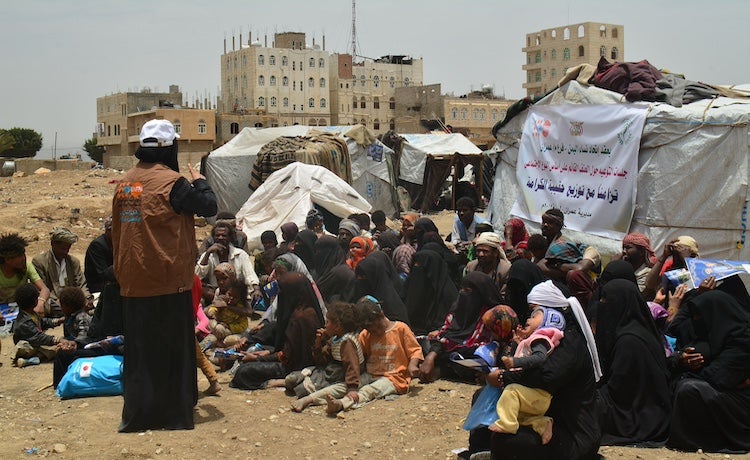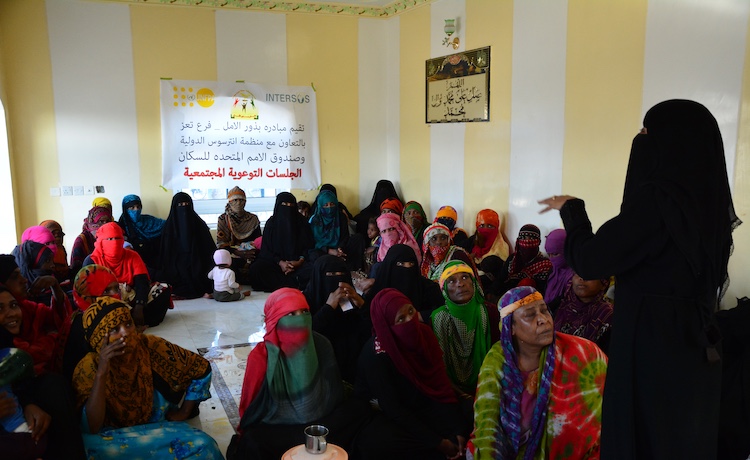News
Tackling the hidden mental health crisis in Yemen
- 08 January 2024
News
IBB GOVERNORATE, Yemen – “I wanted to be a midwife – midwives are respected. I thought being a midwife would give me the freedom to help and guide other women to have fulfilling lives,” Kholoud told UNFPA, the United Nations sexual and reproductive health agency.
Tragically, her talent and drive were used against her for many years. When she was just six years old, her father took a second wife – a stepmother who was physically and verbally abusive towards the eight children.
“Despite the abuse, I was determined to go to school and complete my education. When I finished high school, I pleaded with my father to allow me to study midwifery. He reluctantly agreed, in spite of my stepmother’s dissuasion.”
When she finished her studies, a man offered Kholoud his hand in marriage when she was just 17. “I knew nothing about him, but I agreed without hesitation to escape home.”
She was employed as a midwife in a nearby health centre. But just three years later the conflict erupted, shutting down the facility.

A spiral of abuse
Soon Kholoud’s husband also lost his job; with three children and no income, stress and anxiety levels at home rose rapidly.
“My husband started to exploit me: He took all my money and belongings and sold them to open a small clinic in the village,” she said.
“He forced me to work day and night, without even a break to be with my children.” A career that had promised dignity and freedom became a nightmare instead. “He would keep the children in the clinic for me to look after while I worked. He took all my income and kept pressuring me to make more money.”
Kholoud was close to collapse. “I was completely burned out. When I could no longer work, he started to insult and curse me constantly... Finally I reached breaking point.”
Her father drove her six hours to one of the country’s few remaining mental health facilities in Taiz. Although her health started to improve, the travel and $2,000 cost of the intervention was too much for her or her father to bear and she had to discontinue treatment half-way through.
Soon her husband found her and demanded she return. She complied to protect her children from being hurt, but said, “the constant exploitation and humiliation broke me. I ended up worse than before.”

A hotline to help
Kholoud sought refuge at her sister’s home. When they heard a radio announcement about UNFPA’s mental health hotline, her sister immediately called the number. The next day Kholoud arrived at a mental health centre in Ibb supported by UNFPA and funded by the European Union. She received medication free of charge and was treated for five months.
When she recovered, she was referred to a UNFPA safe space for women and girls, which, along with protection and counselling, provided legal support so she could get divorced and claim custody of her children.
“When you lose all hope and the will to live, then suddenly relief comes to you… This is how the mental health centre saved me,” Kholoud said.
Today, Kholoud is 28 and renting a small house for herself and her children. She has reclaimed her professional life as a midwife in a nearby hospital, which the health centre helped her to secure. Her work is critical in a country where a woman dies during pregnancy and childbirth every two hours.
At last able to deliver midwifery care in a safe environment, Kholoud feels a renewed sense of purpose. “I am finally free from exploitation, abuse and exhaustion. People appreciate my work and respect me.”
Mental health needs soar as conflict deepens
Conflict and deprivation have taken a heavy toll on millions of Yemenis, particularly women and girls. About 80 per cent of the population is food insecure and 21.6 million people are in urgent need of assistance.
An estimated 7 million people need mental health support, but only 120,000 have uninterrupted access to these services. There are just 46 psychiatrists for the whole country – one for every 700,000 people.
Gender-based violence has been greatly exacerbated by the conflict, and with limited shelter options and a breakdown in protection mechanisms, girls are increasingly vulnerable to forced and child marriage, human trafficking and child labour.
UNFPA leads gender-based violence response services in Yemen, ensuring survivors can access protection and support services, medical assistance, community-based psychosocial care where available.
In the last five years, UNFPA has established six psychological support centres with funding from the European Union, Norway and the United States. In 2023 alone more than 100,000 people received psychological support through the hotline and in person at the centres – over three quarters of whom are survivors of gender-based violence.